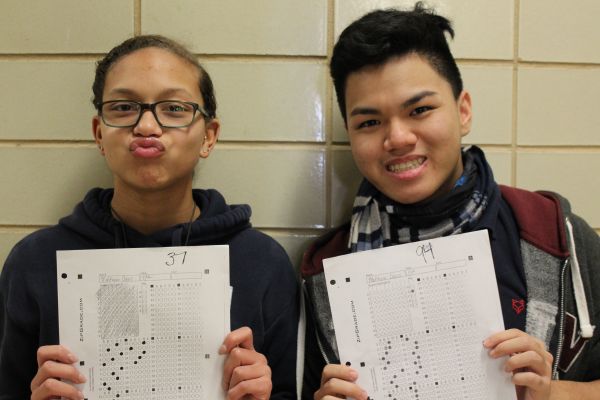Should Students be Segregated in School Based on Ability?

SHOULD STUDENTS BE SEGREGATED IN SCHOOL BASED ON ABILITY? — Alexis Massengale (left) and Matthew Phan (right) show off their contrasting grades.
January 8, 2019
At Central, students are known to congregate with all classmates. Students and teachers do not separate based on race or gender as commonly done before the twentieth century. In recent years, however, grouping based on ability has become a common practice. This educational aspect is highly controversial, especially among the students who experience it every day.
Many Central students agree with this practice being put into a negative spotlight, agreeing that integration has many positive benefits:
“Separating them would limit the people in lower achieving classes because they would not have the same opportunities as higher achieving students. The people in higher classes would automatically get the better chances, even though everyone is getting the same overall education,” expressed Senior Josh Bolton.
“I feel like it would be a bad idea [to categorize students]. People who are not as good of learners often learn from the more advanced students, but that can not happen if these two types of students are never together,” explained Chris Massengale, a Central freshman.
“I think students need to be mixed together, which forces students to learn to work with each other and help each other. Normally, students learn just as much from each other as their teachers, but that would not happen if all the kids were the same,” revealed Taylor Hearrell, a junior at Central.
However, many students took the opposing view, believing that categorizing students based on their talents would have positive side effects for the students:
“They should [be separated], because it will motivate kids to work harder to try and move up, and all of the kids will get along since they are on the same level and would likely have things in common,” vocalized Dimas Azoca, sophomore.
“It is a good idea, but would create a need for different education tracks. The groups with higher ability would need faster, more advanced courses than other students because they require it to reach their full potential. The advanced kids should not have to drop down to everyone else’s level, schools should accommodate to their needs,” shared Senior Edicklee Frias-Cruz.
Segregation in schools has generally been seen as a negative practice. However, this separation of students can be based on multiple factors, controversially by ability. Although the separation of students could have multiple positive affects for some students, it would decrease the overall education of the student body as a whole.




